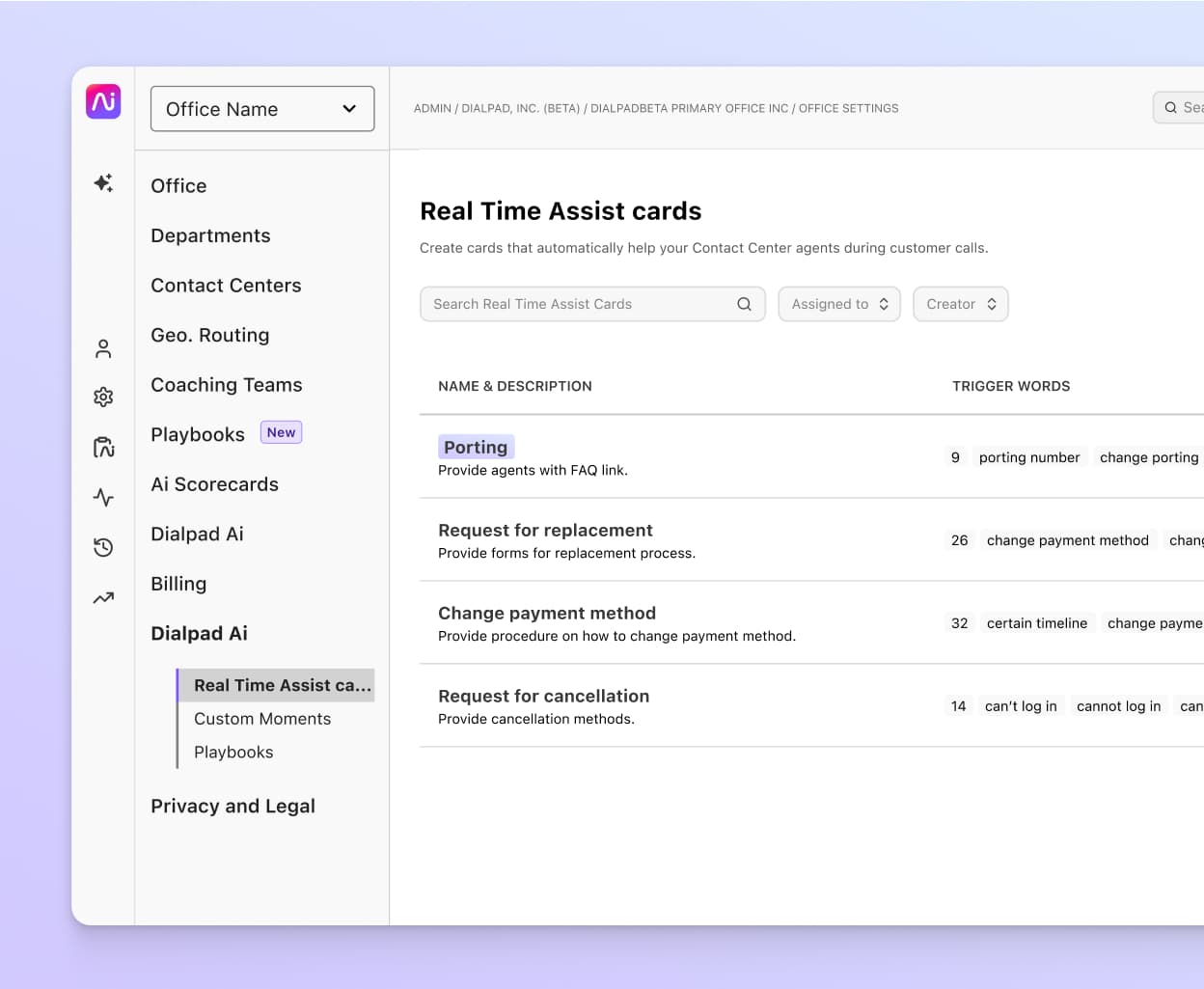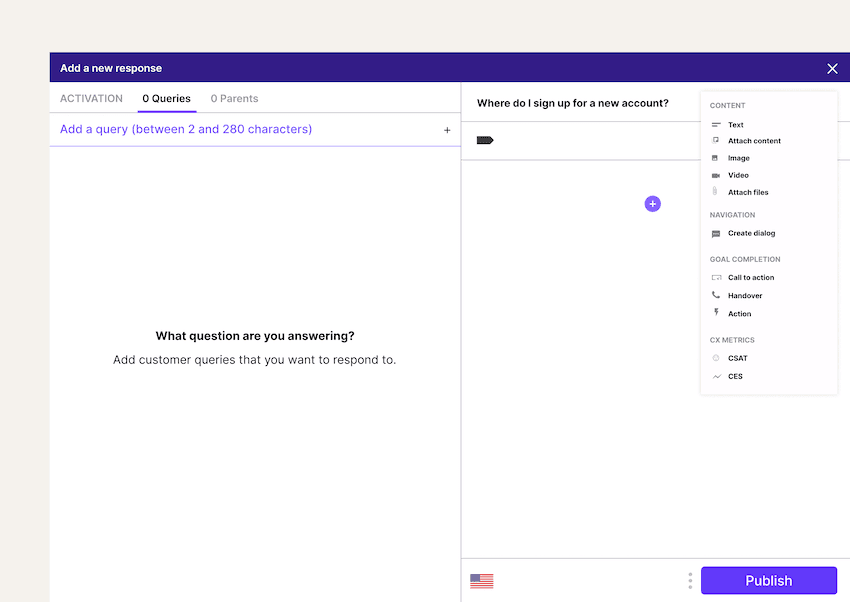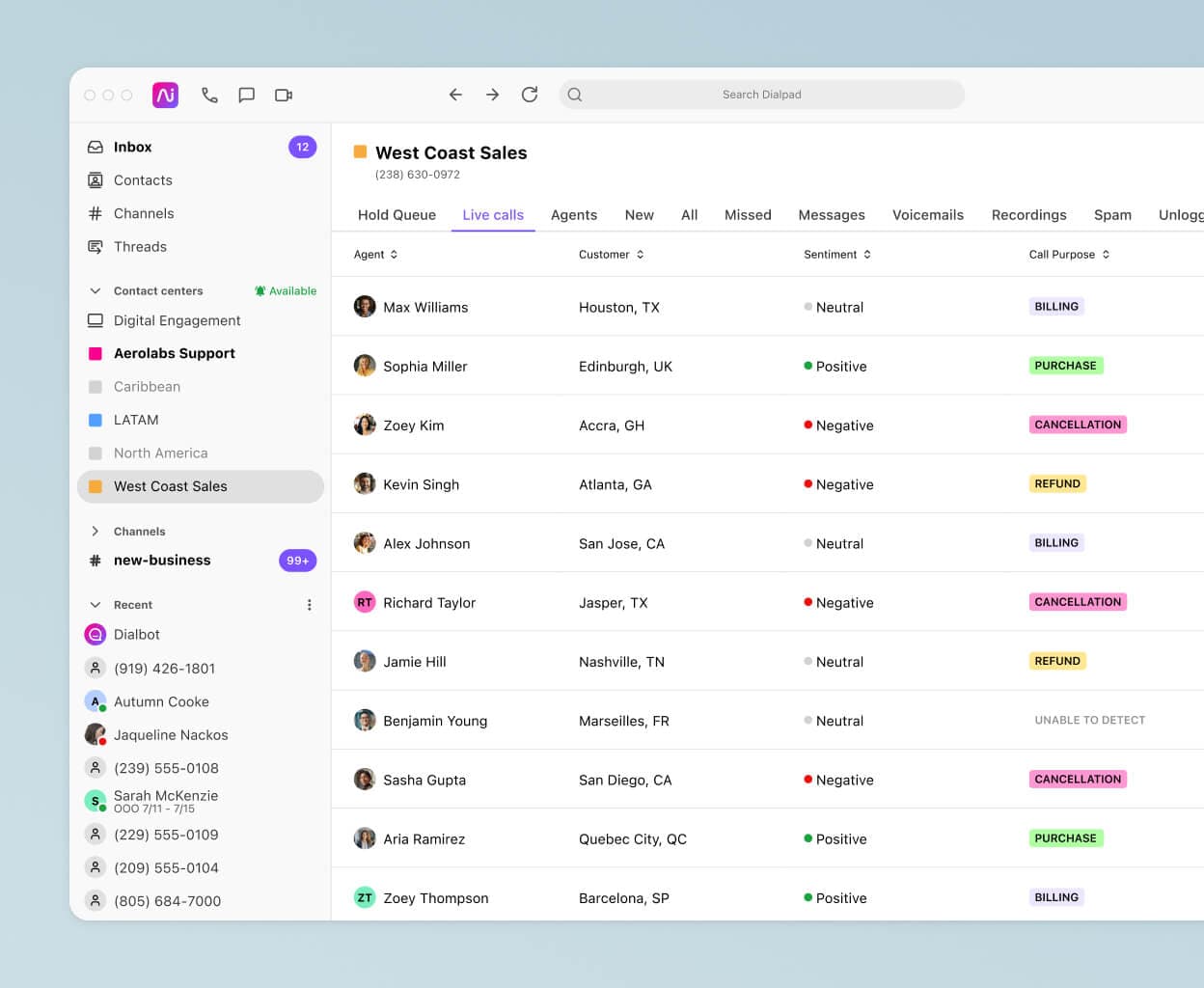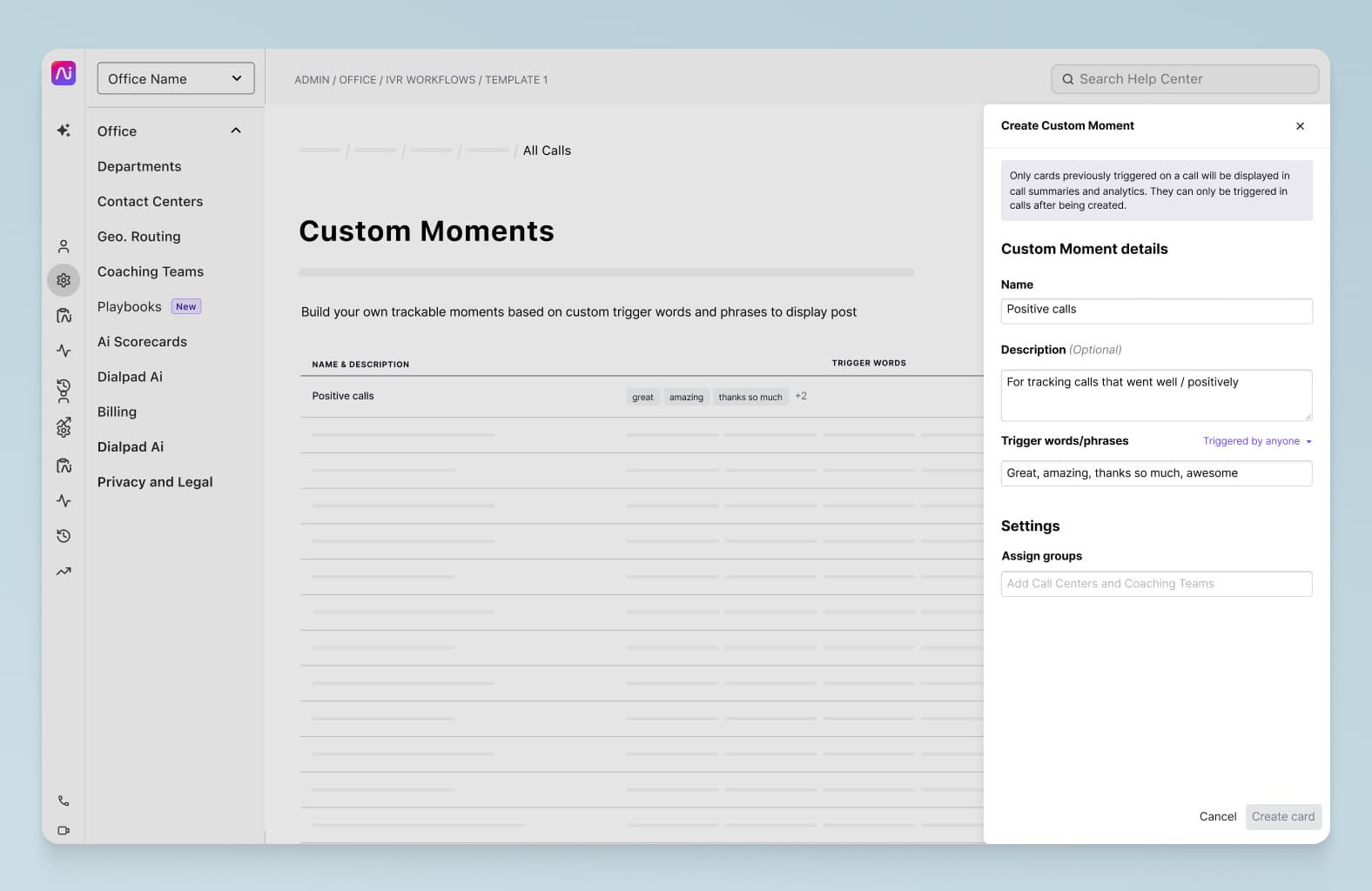AI in customer service: How your business could benefit from customer service AI

VP of Customer Experience

Tags
Share
There are some common misconceptions around what AI customer service is. You might have visions of robots wearing headsets while they chat with customers on the phone. But—for now at least—that’s not the reality.
Instead, the role of AI in customer service is much more nuanced, but also much more powerful.
That’s because advances in artificial intelligence are now creating a sea-change in how businesses interact with customers. So much so, in fact, that it’s making many aspects of service delivery more efficient.
What is AI customer service?
AI customer service is the use of artificial intelligence technology to improve customer service provision.
If you still think of AI as being something that belongs in the realms of science fiction, no-one could blame you. Although there’s been a buzz around it in the tech community for years, it’s only recently—with the rise of platforms like ChatGPT and Midjourney—that we’ve begun to notice a significant real-world impact.
When it comes to customer service, AI is turning out to be one of the more revolutionary innovations for many years. The sheer range of available AI tools for customer service is truly impressive.
For instance, modern chatbots often use AI and machine learning, and it’s fair to say that when you’re talking to a chatbot, you can’t always be fully certain you’re not chatting with a human.
There’s much more to AI in customer service than that, too. In fact, there are numerous ways to use AI to improve the customer experience, from taking advantage of technology like sentiment analysis to streamlining workflows with smart automation.
The benefits of AI in customer service
So, how can AI help your customer service agents to raise their game? Well, there are a number of advantages, some of which you might not have considered:
Faster, more consistent support
Speed is of the essence when a customer needs support. No-one wants to be hanging on the phone for hours on end or waiting for ages to have a complex query resolved.
So here’s some good news: In a recent survey, nearly 60% of customer service professionals said that AI is a time-saver. That’s right, almost two thirds of those working in the field report that they’ve been able to respond to clients much faster thanks to AI.
You might be wondering: How can AI improve customer service speed like this? Here’s an example.
With Dialpad Ai Contact Centre, supervisors can set Real-Time Assist (RTA) cards to prompt agents with helpful tips in-call when a customer uses a particular phrase or keyword.
For example, suppose you’re running the admissions team support for a university and lots of new students are calling to ask about how to find enrolment information.
You could set up an RTA card to pop up on the screen whenever the system detects the word “enrolment”. So, the agent has all the information readily at their fingertips:

As you can imagine, this is a huge help to your agents. It empowers them to deliver the right information as quickly as possible, so the whole conversation goes smoothly.
Greater customer satisfaction
As AI contributes to resolving queries more efficiently and quickly, it naturally improves the customer experience. And as a result, overall levels of customer satisfaction are generally higher.
What’s more, you can track your customer satisfaction scores (CSAT) more accurately with AI tools such as Dialpad Ai CSAT. This handy feature monitors customer satisfaction in real time, so you can assess and record it within seconds of a call finishing.
What this means in practice is that you don’t have to wait around for the feedback to come in to have a good idea of how your teams are doing.
You can even access granular breakdowns of each individual agent’s performance, which means you can quickly identify who needs more support to meet their targets.
Improved staff or agent engagement
Using AI in customer service benefits your staff in other ways, too. For one thing, it’s terrific for automating those mundane, daily tasks like:
Password reset procedures
Responding to common, simple questions
Handling order tracking queries
This saves your agents a lot of time and enables them to get on with more complex tasks that need human input.
In general, AI customer service solutions can be a game-changer when it comes to employee engagement because it enables them to work much more efficiently to achieve their objectives.
In fact, as many as 79% of sales and customer service professionals using it at work say they’ve already experienced the positive impact of AI on their performance.
More accurate forecasting and prediction of customer behaviour
A further useful application of artificial intelligence in customer service from a strategic point of view is for analytics and forecasting. That’s thanks to its ability to crunch enormous amounts of data and generate actionable insights from it.
With AI customer service software, you can use disparate data sets to:
Identify where common customer pain points are and how to solve them
Develop personalised recommendations to target individual customers effectively
Find potential weaknesses in manufacturing production processes
Predict which customers are more likely to be receptive to upselling or cross-selling
Determine which customers are more likely to churn and when.
Ultimately, having this kind of information at your fingertips has a huge impact on all sorts of metrics, from customer retention to overall profitability.
Cost-efficiency
AI-based customer service is also very cost-efficient because it can help streamline workflows across the board through automation.
For instance, instead of having to rely on traditional call queue models, you can deploy AI to use smart routing. This directs the customer query to the most appropriate agent, increasing first call resolution rates and reducing the total volume of calls your team would otherwise have to handle.
In addition, the overall time your service staff have to spend resolving each call reduces thanks to the vast array of AI-assisted tools at their disposal. As a result, you see a leap in call centre productivity and a reduction in costs.
8 Examples of AI in customer service: How your customers and business could benefit
You may be wondering how to use AI in customer service. What are the practical applications and how can they help you deliver the kind of top-tier customer experience your clients deserve?
Here are eight AI customer service examples of exactly that:
Chatbots and conversational AI
If you tried your luck with a chatbot just a few years ago, you might have found them less than helpful.
The first generation of chatbots depended on pre-programmed responses. This was all right as far as it went—but it didn’t go particularly far. If your query happened to be a little complex, it was very likely the chatbot wouldn’t be able to help you.
Today, conversational AI is changing that. Instead of relying on preset answers and multiple-choice questions, AI chatbots analyse the context of a request and do a broad sweep of different data sources to formulate a useful response.
Dialpad Ai features a chatbot functionality that works in tandem with your support operatives so that customers can access human assistance when they need to.
Your agents can also define queries within the system to provide specific responses using a simple drag-and-drop functionality:

2. Natural Language Processing (NLP) and sentiment analysis
AI depends on innovative supporting technology such as NLP, which is a way of training computers to understand human language.
It enables the AI to perform a number of crucial tasks. For instance, Dialpad Ai can transcribe calls in real time with a high degree of accuracy, meaning you always have an up-to-date record of all communications.
What’s more, it can search these conversations for key phrases and analyse how often they appear. This is a terrific way of identifying pressure points in service delivery so you can rectify them before they turn into problems.
Let’s say customers are asking to return a specific product much more often than others due to a fault. You can set up a Custom Moment through your Dialpad dashboard to monitor how often a customer mentions the name of the product during a call.
You’ll be able to diagnose the problem much more quickly than you would by collating reports manually.
Similarly, NLP allows for in-callsentiment analysis. Your supervisors can bring up a screen where they follow all the calls your agents are currently taking. There, they’ll be able to see at a glance what kind of mood each customer is in as they speak: positive, neutral, or negative:

With this information, the supervisor has the option to step in to help an agent if it looks as if they need additional support in the moment.
3. Smart automation of internal processes and workflows
Increasing efficiency in internal workflows is an essential goal for many organisations. It’s also a key strength of AI solutions.
One of the ways they do this is by integrating seamlessly with your other platforms. For instance, if you integrate Dialpad Ai with your Salesforce CRM, it embeds a dialler there so that your agents can pick up calls without leaving the Salesforce screen.
This removes the need for manual logging of calls and dispositions, so you have joined-up records updated continuously.
4. Providing an omnichannel experience
Better connecting communication channels is another benefit of leveraging the power of AI in customer communication. In other words, you can immediately upgrade customer service with AI simply by using it to smooth the way when your customers call.
Let’s face it, as a customer, there’s nothing worse than calling a company for support and being passed from pillar to post. Even worse, when the first agent can’t resolve an issue and transfers you to a supervisor, you’re back to square one, explaining the problem all over again.
An AI customer service platform puts an end to this frustration. It joins up the dots no matter which channel a customer initially contacts you from.
Let’s say they first try to resolve their issue with your chatbot, but it turns out they need a human agent’s help. An AI-powered customer service chatbot can transfer them to an appropriate agent but also provide that agent with the background to the query.
This means your agent can hit the ground running and deal with the issue as soon as they pick up the phone. They won’t have to ask the customer to explain the issue again because they’ll already have all the details.
5. Machine learning to continually improve service provision
One of the great things about machine learning is that it’s dynamic. It’s a process that delivers continual improvement via smart learning.
For instance, Dialpad Ai’s chatbot can search for relevant information not only in structured databases but also within unstructured sources of data such as PDF documents or previous customer conversations.
With each and every interaction, it learns more, meaning you see iterative improvements in its service delivery. In other words, it gets smarter and smarter over time, which is great news for both your agents and customers.
6. Multilingual support
A crucial element of customer service is meeting the needs of all your customers—and that means you need to speak their language.
Traditionally, if you wanted to offer a multilingual support service, you had to hire multiple staff proficient in every language you wanted to offer support in.
For many companies, it’s not realistic to hire enough agents to cover more than a couple of languages across multiple work shifts. But what you can do is offer multilingual support through some AI-powered functions.
Chatbots might be the first thing you think of here, and indeed, that’s a good example. You can certainly set up language detection on an AI chatbot to respond in the language of your customer’s choice. However, there are other options.
For instance, you can use an Interactive Voice Response (IVR) system with multilingual support to act as a virtual receptionist. When customers call, they’re greeted with a menu of options for routing or self-service. Dialpad lets you set custom greetings, which can be created for a wide selection of languages.
7. AI-supported training and coaching
Staff needs vary when it comes to training. A senior agent with five years’ experience won’t get much benefit from a programme devised for new hires. Whereas new joiners can easily feel out of their depth if they’re thrown into detailed training too soon.
Inappropriately pitched training isn’t great for staff morale—or indeed, for your staff retention figures. Which is why putting personalised training in place is so important.
It’s one of the often-underappreciated AI use cases in customer service, but the tech really does shine here.
In-call coaching can take an inexperienced newbie to expert level in much less time than traditional training would. With the help of RTA cards and Custom Moments, your staff are constantly learning on the job:

And, of course, your supervisors can easily track agent performance using AI-powered features like Dialpad Ai’s QA Scorecards.
These give an automated report on how well the agent met the customer’s needs in each call, so you can easily see how all your team members are performing without listening to the full call recording or reading the transcript.
In turn, this helps you identify the current training needs of each agent so you can develop programmes tailored to each individual.
8. Collection and analysis of customer feedback
One final significant benefit of AI is that it works in real time, giving you instant access to information. That means you don’t have to wait for customer feedback.
Of course, you can still collect customer feedback in traditional ways, too, such as through email surveys or online forms.
One of the downsides of using those methods alone, though, is that you never get a 100% response rate. What usually happens is you only get feedback from customers who are either very happy or very unhappy, and the others don’t get in touch.
Instead of having customers manually fill out a CSAT survey (which not everyone fills out), Dialpad's Ai CSAT feature, provides a predicted score based on the data it collected in-call using things like sentiment analysis.

This helps generate truly actionable customer insights that reflect the experience of every customer, not just the delighted or discontented ones.
Harness the power of customer service AI
Dialpad Ai gives you all the customer service AI tools you could possibly need to take your call centre’s performance to the next level.
Whether you’re aiming to streamline your workflows, improve first call resolution rates, boost customer satisfaction, or upgrade your training programmes, Dialpad Ai helps you achieve all this and more.
Dialpad has the customer service AI features you need
AI-powered agent assists to conversational chatbots, Dialpad helps your support team work more efficiently. Learn more by booking a demo, or watching a tour of the Dialpad app!








